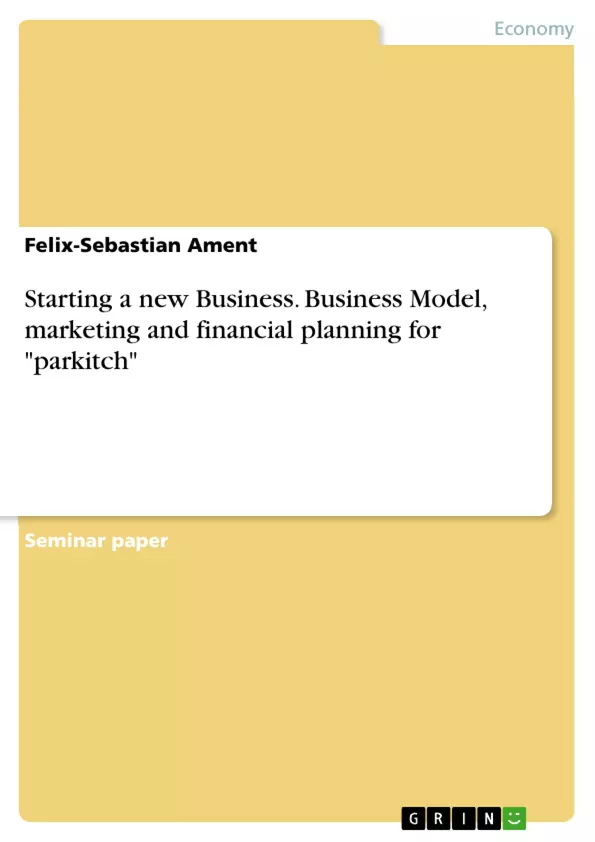All over the world, people in big cities waste vast amounts of time and money looking for a parking space. In addition to time and money, groaning for a free parking space is also nerve-wracking and environmentally harmful. "parkitch" solves this problem. For this purpose, the author is creating a closed system that makes it possible to find free parking spaces. Users can pass on their vacant parking space to another user. Free parking spaces can be reserved according to the user's needs.
"parkitch" thus shifts the annoying search for a parking space to the online world, automating the search for a parking space at a specific place and time.This solution sets new standards in the field of "autonomous" and "predictive parking" and are thus one step closer to a fully connected automotive industry. "parkitch" generates revenue in three ways: a premium app subscription, in-app purchases and as an advertising platform. The market focus is on unmanaged on-street parking, which is home to numerous user segments in private and commercial traffic. The estimated market volume in Germany alone far exceeds billions.
Inhaltsverzeichnis (Table of Contents)
- Executive Summary
- Service
- Service Description
- Customer Benefits
- First Mover Advantage
- Development App and Website
- Market and Competition
- Sector and Overall Market Analysis
- Market Segments and Target Customers
- Competition Analysis/Observation
- Business Model
- The Business Model
- Management and Key Positions
- Staff
- Milestone Planning
- Marketing and Distribution
- Pricing
- Distribution Concept
- Communication Measures
- Market Entry Strategy
- Opportunities and Threats
- Financial planning
- Profitability planning
- Investment Planning
- Liquidity planning
- Capital requirements and financing
- Company Value
Zielsetzung und Themenschwerpunkte (Objectives and Key Themes)
This business plan for parkitch outlines the strategy for establishing a new business venture focused on providing innovative parking solutions. The plan covers various aspects, from service description and customer benefits to market analysis, competition assessment, business model, marketing, and financial projections.
- Developing a comprehensive business plan for a new parking solution venture.
- Analyzing the parking market and identifying target customer segments.
- Defining a robust business model and key operational strategies.
- Developing marketing and distribution plans to achieve market penetration.
- Evaluating financial projections and assessing investment requirements.
Zusammenfassung der Kapitel (Chapter Summaries)
- Executive Summary: Provides a concise overview of the business plan, highlighting the key features, objectives, and financial projections of parkitch.
- Service: This section describes the core service offered by parkitch, focusing on its innovative approach to parking solutions. It discusses the customer benefits and the competitive advantage derived from being a first mover in the market. The development of the mobile app and website is also addressed.
- Market and Competition: This chapter delves into the analysis of the parking sector and the overall market, including a detailed examination of market segments and target customers. It also analyzes the competitive landscape, identifying key players and their strengths and weaknesses.
- Business Model: This chapter outlines the business model of parkitch, explaining its operational structure, management, and key positions. It also discusses staff planning and milestone planning to ensure a successful launch and sustainable growth.
- Marketing and Distribution: This section outlines the marketing and distribution strategies for parkitch, covering pricing, distribution concept, communication measures, and the market entry strategy. It aims to effectively reach and engage the target customer segments.
- Opportunities and Threats: This chapter identifies potential opportunities and threats that parkitch may encounter in the market. It analyzes the external environment and provides a framework for developing strategic responses.
- Financial planning: This section focuses on the financial planning for parkitch, covering profitability planning, investment planning, liquidity planning, and capital requirements and financing. It also examines the projected company value.
Schlüsselwörter (Keywords)
The main keywords and focus topics of the business plan include parking solutions, mobile app development, market analysis, customer segmentation, business model innovation, marketing strategy, financial projections, profitability, investment, and liquidity. The plan highlights key themes such as competitive advantage, first mover advantage, customer benefits, and market penetration.
Frequently Asked Questions
What is 'parkitch' and what problem does it solve?
'parkitch' is an innovative parking solution that allows users to find and reserve free parking spaces in big cities, reducing time wasted and environmental harm.
How does the parkitch business model generate revenue?
Revenue is generated through three main streams: a premium app subscription, in-app purchases, and by serving as an advertising platform.
What is the market focus of parkitch?
The market focus is on unmanaged on-street parking, targeting both private and commercial traffic segments.
What competitive advantage does parkitch aim for?
The company aims for a 'First Mover Advantage' in the field of autonomous and predictive parking solutions.
What does the financial planning section of the business plan cover?
It covers profitability planning, investment planning, liquidity planning, capital requirements, and the projected company value.
How does the system automate the parking search?
Through a closed online system, users can pass on their vacant parking spaces to others and reserve spaces according to their specific needs at a set place and time.
- Citation du texte
- Felix-Sebastian Ament (Auteur), 2021, Starting a new Business. Business Model, marketing and financial planning for "parkitch", Munich, GRIN Verlag, https://www.grin.com/document/1168788



